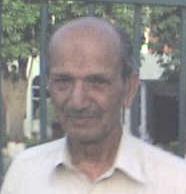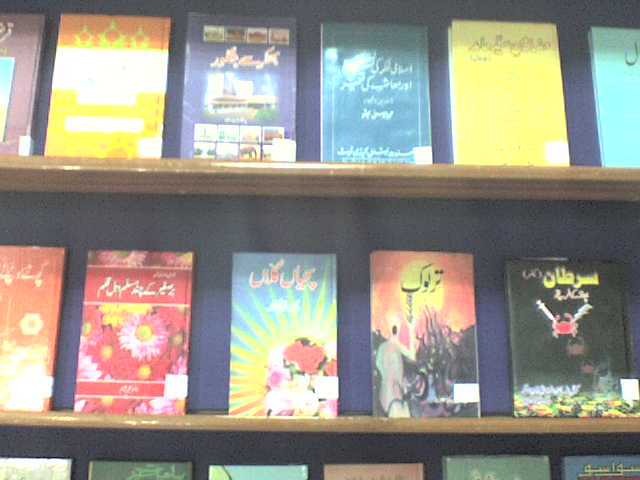Malik Khushi Muhammad
Malik Khushi Muhammad (b. 1927 A.D), is a famous revolutionary Sufi poet of Punjab, Pakistan. Malik is the third in the line of awami poets of Pakistan, after Ustad Damin and Habib Jalib. His poetical verses were published by a friend in 2007, at his 80th Birth Anniversary, with a title "Sachiyaan Gallaan", which proved to be a classic of modern Punjabi poetry.
Childhood
Malik Khushi Muhammad was born on May 21, 1927 in the village of Chak Mukand, District Amritsar, Punjab, British India. His father, Malik Feroz Deen, was the son of the Namardar of the village. His birth was a source of happiness for his parents, since he was their only son, thus they named him 'Khushi' (happiness).
Early Education
Malik Khushi Mohammad was admitted in a local madrassa for Quranic education, in his early age. He also attended a village school for worldly education, and was very intelligent student of his class, but after the death of his aged father, all responsibilities fell on his shoulders and thus he had to leave his school life and had to enter in the practical life. Once a person asked Malik's educated friend, "What is his [Malik's] education?" on which he replied, "Where our education ends, his education starts".
After Partition
Malik did several jobs before the Partition of India and had to leave his last job due to his family's migration to Lahore from Amritsar in 1947. He was a keen supporter of All-India Muslim League at the time of partition and during partition he was made the head of the welfare committee of refuges of his village and adjoining towns and he performed his duties very sincerely and efficiently and, thus, was praised by then leaders for his honesty.
Revolution in Malik's Life
After coming Lahore, on September 01, 1947, he joined West-Pakistan Railways, Mughalpura Lahore where he stood first in Railway's test. Here, he met saint Majad-al-Deen, renowned as Hazrat Baba Maoj Deen Sahib. Maoj Deen was a highly educated Sufi saint of Chishti Order and among his mureeds were the people from every religion, including Sikhs, Muslims, Christians and Hindus. He had close association with several revolutionary poets and leaders of his time, notably Sir Dr. Muhammad Iqbal, Comrade Rafiq Ahmad, Dada Amir Haider and several young leaders of Naojwan Bharat Sabha. Baba Maoj Deen is, also, considered to be the first Marxist teacher in Lahore.
Malik became the pupil of Baba Maoj Deen and under the influence of his pious Guru, his life totally changed. His mind's political inclination changed from Muslim League's religious politics to Socialists' secular politics. He remained a worker of Mirza Ibrahim, the renowned worker leader of Railway Workers' Union, but latter when Mirza deviated from the revolutionary path, he denounced him and joined Comrade Murad Baksh.
Religious and Political Ideology
Though, Malik Khushi Muhammad was born in an orthodox Muslim family but under the proper guidance of his Peer (Guru), he now call him self just a 'humanist'. He denounced his affiliation with any sect of Islam, or any other religion. Now his only affiliation is with humanistic path of Sufis and Sants and the revolutionary path of comrades which led to a classless and peaceful society. To him people of all religions are equally respectable and should have equal rights. At one place in his poetry he says,
NA MAIN HINDU NA MAIN MUSLIM
NA MAIN SIKH, ESAAI
NA MAIN SHEA NA MAIN SUNNI
NA HAAN MAIN MARZAAI
ALLAH DA MAIN BANDA HAAN BAS
MAZLOOMAAN, GHAREBAAN DA MAIN BHAAI
MAINOON MAIRAY MURSHAD-E-KAMIL
BABAY MAOJ NAY GAL SAMJAAI
Poetry
Malik Khushi Muhammad's poetical work "Sachiyaan Gallaan" was published in 2007 to commemorate his 80th Birthday. It has filled the gap, of revolutionary poetry, created with the deaths of Habib Jalib and Ustad Damin.
Malik use to read poetry of Sufi poets of Punjab since his youths but never wrote his own poetry until his meeting with Baba Maoj Deen. Under the discipleship of his Guru he wrote his first verse. Thus the influence of Maoj on his poetry is obvious.
His poetry carry the message of humanity, equality and dignity. At one time, he preaches the humanistic lessons of Bhagat Kabir, Bulleh Shah, Shah Hussain and Sultan Bahoo and at the same time, spread the revolutionary message of Marx, Lenin and Faiz. To him, the message of all Sufis, walis, bhagats, gurus, prophets and revolutionaries is same; they all came to defend the rights of oppressed ones and to liberate the humanity from the paws of capitalist oppressors. He writes:
AASMAN RAB DA TAY ZAMEEN RAB DI
RAB DAY BANDAYAAN DI, SANJHI SAB DI
KHALI HATH HI HAR KOI DUNYA TAY AAYA AY
DASAY KAIHRRA REGISTRI APNAY NAAL LYAYA AY?
In his poetry, also, found his attachment with his mother land (Punjab), ma-boli (mother tongue) and the Punjabi culture. He is also a fan of Amrita Pritam, the legend poetess of Punjab, whom he had paid a warm tribute in his poetical work. At her death, he wrote:
MOI WARIS SHAH DI BEHAN AA CHOTTI
PUNJAB DARD WICHOORRA SEHNA RAWAY GA
RAAKHI MA-BOLI DI KHO LAYE SATHOON
SHIKWAA ALLAH DAY NAAL HONDA RAWAY GA
Tribute
- Javed, the son of Baba Malang Sahib, says, "[Malik] Khushi Muhammad is the voice of voiceless (oppressed and poor) people".
- Qayem Naqvi, the famous poet of Pakistan, "Khushi Muhammad faraib tay chooth da karobar karan walyaan day moonhoon naqab laun di koshish kar rahay nain."
![]() This article is a stub. You can help SikhiWiki by expanding it.
This article is a stub. You can help SikhiWiki by expanding it.


